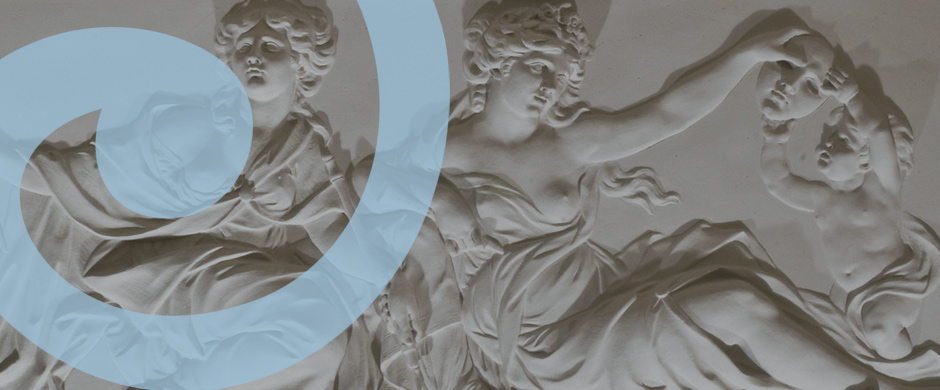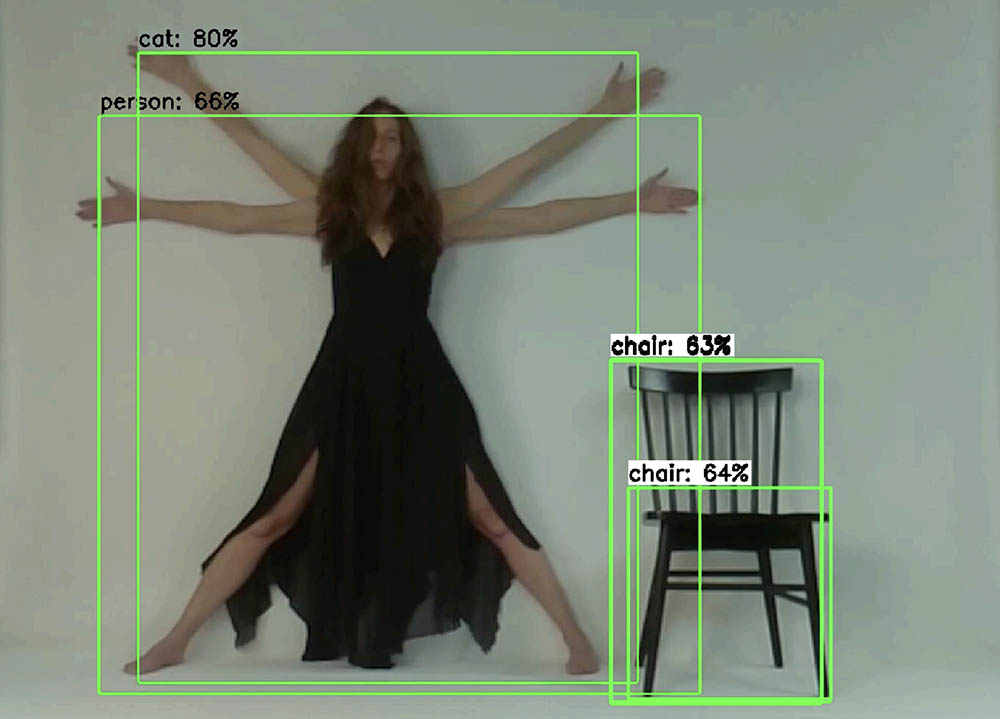 | ON DISPLAY
| ON DISPLAY

The Great Hall Exhibitions Archive
There are two Great Hall Exhibitions per year showcasing prominent contemporary artists. Taking place in the fall and spring semesters, the expansive great hall of the Duke House, a historic landmark building, provides an impressive setting for displaying seminal contemporary art in the center of the Institute’s academic home and community.
Spring 2022
Avital Meshi: Subverting the Algorithmic Gaze
Online opening: March 28, 2022
Launch exhibition websitePublic Programming
Monday, May 9, 2022
Privacy, Security, and Race in AI
Speakers: Simone Browne, Kade Crockford, Heather Dewey-Hagborg, and Avital Meshi
The Institute of Fine Arts invites you to attend an important discussion between Simone Browne, Kade Crockford, Heather Dewey-Hagborg, and Avital Meshi, on Privacy, Security, and Race in AI. This exemplary group of artists and scholars will discuss one of the most pressing and pervasive issues of our day: the proliferation of modes of surveillance and how they disproportionately harm marginalized communities.
About the panelists:
Simone Browne is Associate Professor of African and African Diaspora Studies at the University of Texas at Austin. She is the author of Dark Matters: On the Surveillance of Blackness. Simone is currently writing her second book manuscript, Like the Mixture of Charcoal and Darkness, which examines the interventions made by artists whose works grapple with the surveillance of Black life, from policing, privacy, and the FBI’s COINTELPRO to encryption, electronic waste and artificial intelligence. Together, these essays explore the productive possibilities of creative innovation when it comes to troubling surveillance and its various tactics, and imagining Black life beyond the surveillance state.
Kade Crockford is the Director of the Technology for Liberty Program at the ACLU of Massachusetts. In that role, Kade leads the affiliate’s work on issues at the intersection of technology and civil rights. Most recently Kade has been leading the affiliate’s campaign to bring democratic control over government use of face surveillance technologies, an effort that has resulted in the passage of eight bans on face surveillance in municipalities across the state including Massachusetts’ four largest cities, initial statewide regulations on police use of the technology, and the creation of a legislative commission to study further reforms. Kade also founded and runs the ACLU of Massachusetts’ Data for Justice project, which uses data science to advance core civil rights and civil liberties law reform.
Dr. Heather Dewey-Hagborg is an artist and biohacker who is interested in art as research and technological critique. Heather has shown work internationally at events and venues including the World Economic Forum, the Daejeon Biennale, the Guangzhou Triennial, and the Shenzhen Urbanism and Architecture Biennale, Transmediale, the Walker Center for Contemporary Art, the Philadelphia Museum of Art, and PS1 MOMA. Her work is held in public collections of the Centre Pompidou, the Victoria and Albert Museum, the Wellcome Collection, the Exploratorium, and the New York Historical Society, among others, and has been widely discussed in the media, from the New York Times and the BBC to Art Forum and Wired. Heather has a PhD in Electronic Arts from Rensselaer Polytechnic Institute. She is a Visiting Assistant Professor of Interactive Media at NYU Abu Dhabi, a Sundance Institute Interdisciplinary Program Art of Practice Fellow, an Artist-in-Residence at the Exploratorium, and is an affiliate of Data & Society. She is a founding board member of Digital DNA, a European Research Council funded project investigating the changing relationships between digital technologies, DNA and evidence. She is also a co-founder and co-curator of REFRESH, an inclusive and politically engaged collaborative platform at the intersection of Art, Science, and Technology, and she co-leads the Decolonising Interactive Media research group at NYU Abu Dhabi.
Avital Meshi is a New-Media and a Performance artist. In her work, she examines the influence of AI technology on our behavior and our social environment. She invites viewers to intermingle with the technology, see how they are being seen through its lens and reveal their agency when confronted with it. Meshi is a Performance Studies Ph.D. student at UC Davis. She holds a BSc and an MSc in behavioral biology from the Hebrew University of Jerusalem, Israel, a BFA from the School of the Art Institute of Chicago, and an MFA from the Digital Arts and New Media program at UC Santa Cruz.
The exhibition continues the Great Hall Exhibition series’ commitment to celebrating the contributions of exemplary women artists. It is the second in the series to take place online. Avital Meshi: Subverting the Algorithmic Gaze will be on view on the Institute’s website from March 28 – June 21. You can view the exhibition online.
This exhibition was made possible through the generous support of Valeria Napoleone XX.
We extend special thanks to the artist for lending her works on view. Goldie Gross, Alejandra López-Oliveros, and Janelle Miniter curated the exhibition. Jason Varone designed the website and Professors Edward J. Sullivan and Christine Poggi provided faculty support.
Monday, April 25, 2022
Performing with AI: Avital Meshi and the Subversion of Algorithmic Gaze
Speakers: Dr. Richard Schechner, Professor of Performance Studies at the Tisch School of the Arts, New York University, and artist Avital Meshi
The Institute of Fine Arts invites you to attend a thought-provoking conversation between theater director, performance theorist, and author Dr. Richard Schechner, Professor of Performance Studies at the Tisch School of the Arts, New York University, and Avital Meshi, the New Media and performance artist featured in this year’s Great Hall Exhibition.
Expanding on the Great House Exhibition’s major theme, this conversation will discuss the performative aspect of Meshi’s works and her interactions with artificial intelligence, highlighting how “conversations with the algorithms” impact Meshi’s playful interaction with the algorithmic gaze.

Avital Meshi, The New Vitruvian, 2022. Still from video performance. Courtesy of the artist. |
The Institute of Fine Arts is pleased to announce its spring exhibition, Avital Meshi: Subverting the Algorithmic Gaze. The exhibition continues the Great Hall Exhibition series’ commitment to celebrating the contributions of exemplary women artists. It is the second in the series to take place online. The exhibition will be on view on the Institute’s website from March 28 – June 21.
New media artist Avital Meshi combines performance and algorithmic activism in her work. She interrogates what it means to be observed by software with identifying capabilities. Using her body and the bodies of those around her, she interacts with and tries to override systems that can be seen as promoting a “modern phrenology.”
Thorin Klosowski, “Facial Recognition Is Everywhere. Here’s What We Can Do About It.,” Wirecutter: Reviews for the Real World (blog), July 15, 2020, https://www.nytimes.com/wirecutter/blog/how-facial-recognition-works/.
In her interactive AI performance Techno-Schizo, Meshi changes her hairstyle and facial expressions to highlight how the confidence level of the program she uses can be altered. As she moves her face, hands, and hair, the system continually tries–and fails–to classify her correctly, underscoring the limitations of facial recognition systems that often have higher error rates with minorities and people of color. Similarly, in The New Vitruvian, Meshi interacts with the algorithm using a chair as a prop. Crossing the porous boundary that defines how human or non-human one appears in the eyes of the program, she moves with the chair and finds herself identified as a person, a horse, a cat, a refrigerator, and a chair, among other animate and inanimate objects. To allow visitors to experience this classification for themselves, Meshi will operate several sessions of her interactive artificial intelligence artwork, The AI Human Training Center, during the run of the exhibition.
In the endurance performance ZEN AI (created in collaboration with transdisciplinary performer Treyden Chiaravalloti), Meshi meditates with the help of two programs. The first of these monitors her and the room in which she sits while constantly classifying her and the objects around her. The other delivers a stream of sometimes ominous, sometimes laughable, instructions to guide her practice. Although this piece initially appears humorous, Meshi’s contrived environment—replete with screens depicting burning candles and message notifications—becomes a dystopian space of constant surveillance and direction. However, Meshi consents to this obvious monitoring to encourage the viewer to become more conscious, as she puts it, of “our current hyper-connected environment in which an asymmetrical, nonconsensual algorithmic gaze exposes our society to discriminatory practices.” Only by gaining greater awareness of the monitoring systems embedded in everyday devices and in the public sphere, and of their use and abuse by government and security agencies, can people hope to bring equity to a growing and problematic form of surveillance.
Meshi’s work invites people to see that they can reclaim agency over technology. It provokes conversations around identity and identity transformation, surveillance, recognition, and classification. As the artist states, it is crucial to recognize “the technosphere as a natural phenomenon not dissimilar to thoughts, or gravity… Acknowledging algorithms as such gives the conscious observer autonomy over the regulation of their impact.”
Avital Meshi (b. 1978, Jerusalem, Israel) is a new media and performance artist based in the San Francisco Bay Area. She holds an MFA from The Digital Art and New Media Program at UC Santa Cruz, a BFA from the School of the Art Institute of Chicago, and BSc + MSc in Behavioral Biology from The Hebrew University of Jerusalem, Israel. She is currently a Ph.D. student in the Performance Studies Program at UC Davis. Meshi has exhibited her work in the Currents New Media Arts Festival in Santa Fe, Root Division Gallery in San Francisco, Sesnon Gallery in Santa-Cruz, ACM SIGGRAPH, NeurlPS, Woman Made Gallery in Chicago, and more.
This exhibition was made possible through the generous support of Valeria Napoleone XX.
We extend special thanks to the artist for lending her works on view and for allowing visitors to experience The AI Human Training Center. Goldie Gross, Alejandra López-Oliveros, and Janelle Miniter curated the exhibition. Jason Varone designed the website and Professors Edward J. Sullivan and Christine Poggi provided faculty support.
About ValeriaNapoleoneXX
ValeriaNapoleoneXX is an umbrella platform for projects and initiatives working towards increasing the recognition and validation of art practices by female artists through collaborations and partnerships with institutions and individuals in the world of contemporary art.
About ValeriaNapoleoneXXIFA
ValeriaNapoleoneXXIFA is an ongoing commitment to underwrite the Great Hall Exhibition Series at NYU's Institute of Fine Arts, two solo exhibitions a year focused on the work of female artists.



